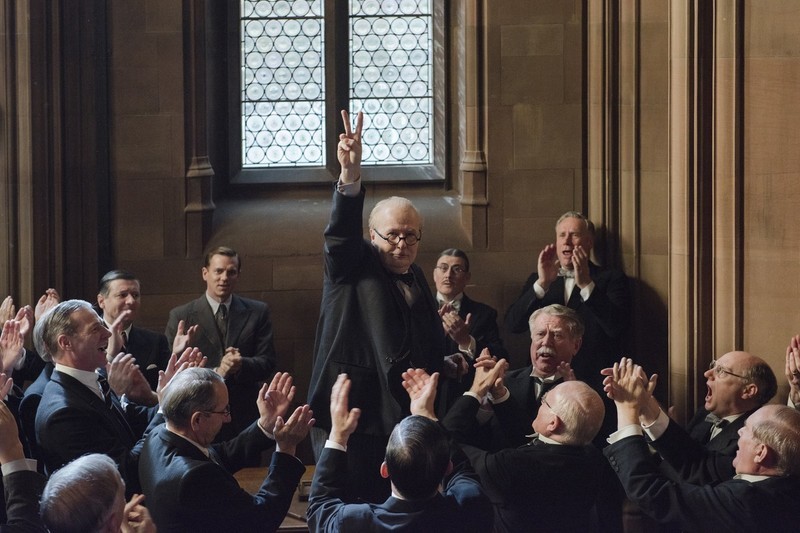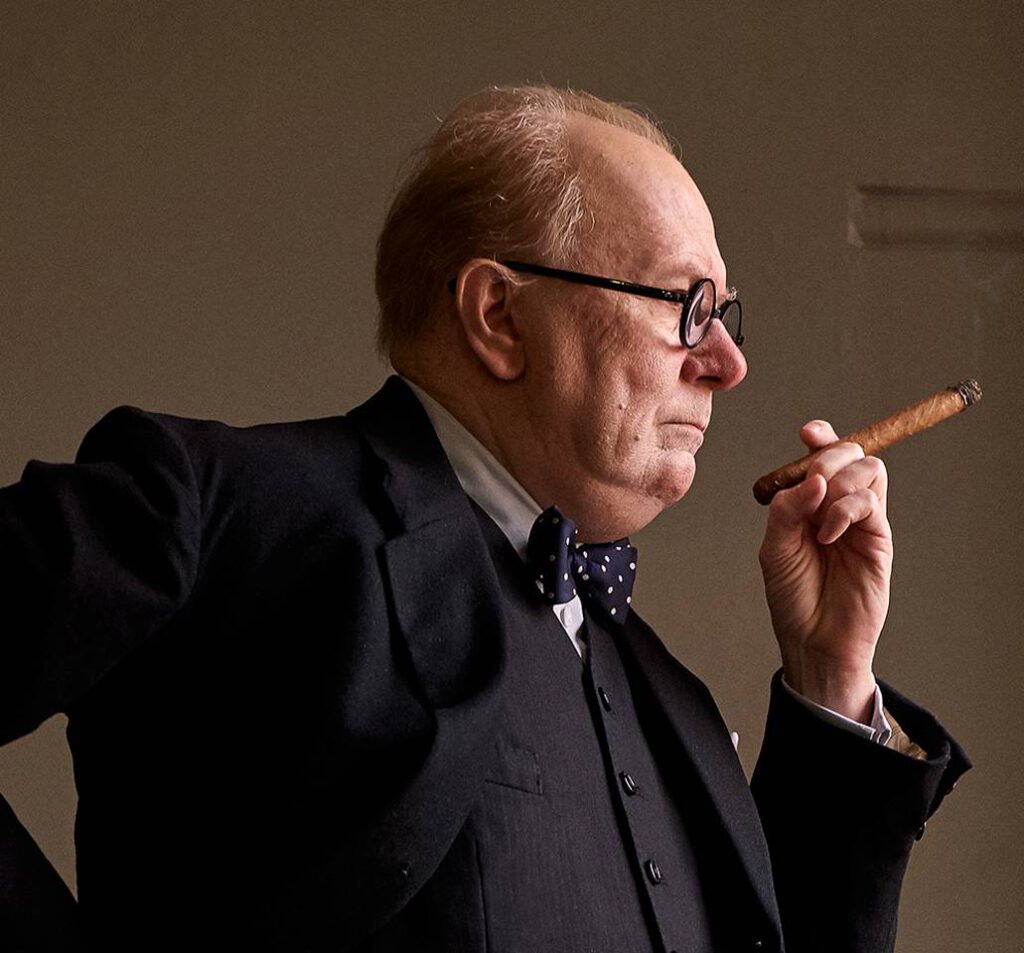With roles like Lee Harvey Oswald, George Smiley, Dracula and Commissioner Gordon in his resume, Gary Oldman has made a special career out of his chameleon-like approach to acting. His latest endeavor is none other than the British Bulldog himself, Winston Churchill, in a film by Joe Wright that looks at the prime minister in the early days of World War II. Oldman is impeccable as the iconic leader, treating his many speeches with fascinating vigor, and looking exactly like him, thanks to prosthetics work and precise physicality. While the role has Oldman designated as an official front runner for this year’s Best Actor Oscar, it’s already a home run for an actor who has made so many distinctly different characters shine on the silver screen.
Oldman spoke with RogerEbert.com about the physical and mental process of getting into the character, looking at Churchill as a type of performer and more.
I’m very curious about your chameleon-like approach to acting. What kind of skill do you think gives you the ability to recognize so many different lives and then portray them?
I think for an actor you need … it’s about observation. I think a lot to do with it is one’s concentration and focus. I sort of have a good ear, a facility for that kind of thing. It’s all the things that you need as an actor. I think you can hone and sharpen intuition, but you kind of have to have it. It’s in the choices that you make. I suppose I was a bit of an impersonator when I was a kid. Even as a young kid. But I do have an ability to meet people and I could very … not with everyone, and not that I consciously do it, but I can meet people and find that I can do an impersonation of people very quickly.
But with Winston, it was exactly that. It was not only the reading material, which is of course voluminous. But the footage of the man, there’s actually more there than I thought. And so it was a case of really just watching and re-watching and studying everything from speech patterns to mannerisms to how he used his hands how he moved through a space. I think that we have an idea of who Churchill was, and I’m not sure if that idea of him is not influenced by other people that have played him, so you feel that you have an idea of who he is because you saw Robert Hardy, or Albert Linney. For me it was to really go back to the man, and avoid all of the other … I watched Robert Hardy at the time when it was programmed, but I didn’t want to be contaminated sort of by anyone else’s performance.
In this telling of Churchill, there’s this angle of him being a type of performer or an actor. There’s even a sort of line about, “which ‘Sir’ am I going to be today?” Did you ever look at him as an actor or connect with him like that?
I think he had a real sense of branding, of marketing. He was an unusual, he was a bit of a dandy. As time moved forward he seemed to sartorially stay in that sort of Victorian attire with the button boots and the waistcoat and the fob watch and that kind of thing and the hats. The cane. The walking stick. So he had a certain affectation, and obviously was a great orator and had a great sense of language. And we have recordings of him, speaking those sort of speeches and three or four of the most glorious speeches ever written over a short period of time. But they were all done after the event, they were all done, some of them, years later. He either went to the BBC and recorded them or the BBC came to him and he recorded them. So, my thinking was, is that when you’re in Parliament, in front of 600 people, that you would do them with more gusto than you would two, three years after the war and record them in a cold, dry setting. My feeling was that he had such a sense of who he was, with the cigar, the Churchill. That he was a bit of an actor. He had a public persona. And loved language, loved plays, loved poetry. I just felt that someone who loved words that much would have performed for the house.
I had heard in a previous interview you’ve done for this film where you said something along the lines of “Joe saw only Winston for three months.” What is your own pitch as to why method acting is a productive idea on set?
It wasn’t so much a conscious decision to do it. What it was, was that I came in four hours before everybody else, to have all the … by the time Joe and the other crew arrived, and the other actors, for rehearsal, I was already Winston. I was completely made up and dressed. Some of the actors I rehearsed with had curlers in their hair, and were half made-up and wore dressing gowns over their street clothes. But I was always on the set as the prime minister. It wasn’t a sort of method thing, it was just the way it worked out. So that Joe would meet me in the morning as Churchill, we would wrap, and then everybody would leave and then it was of course 45 minutes to an hour to take [the prosthetics] off. He would never see me as Gary. He saw me once as Gary at Christmas. My wife and I, he cooked Christmas lunch for us. That was the only time he had seen me as Gary in two months.
Is Joe Wright a good cook?
Yes. He did a good spread [laughs].

The amount of time to put on the prosthetics, does it provide a type of artistic clarity? Could you imagine doing this type of role without prosthetics?
The overriding thing, at the very beginning, was the physicality. It was not so much the getting into the psychology of the character or play the character or move like the character or sound like the character. But could one look like the character? And he is such an iconic figure, he’s so particular looking, that was the hurdle. That was the road block that one had to get around. Yes, I think it would probably be a lot easier in the theater to do it without, but for this film we all felt it was a necessity and there was only one man in my mind that could even remotely pull it off, and that was Kazuhiro [Tsuji]. And then of course, on the day to day running of the show, I had Lucy and David who were my … once Kazuhiro had come in and set it up as it were, then they took the training wheels off and then Lucy [Sibbick] and David [Malinowski] were with me through the whole shoot and they were applying and painting it. But it’s quite a remarkable make-up, I think.
Film artists are always trying to avoid that uncanny valley when portraying old-age with performance and makeup. It seems like a very precise craft here especially, even in how you talk with food in your mouth or with the cigar going in and out of your hands.
And it’s odd with this because, going back to the idea of concentration or focus, you couldn’t watch a movie or be on your phone and fidget, because the make-up was so delicate that you had to surrender to it every morning and focus. As good as the make-up was, David said, “As good as the make-up is, and as good as we are, if you weren’t so patient, this could look like shit.” It’s one of those things, and people roll their eyes when I say it’s three-and-a-half hours in makeup, and they ask, “Did you go crazy?” It’s knowing about what you’re getting into. We had tests, I wore the makeup, with the tests that we did I wore the makeup 63 times. And I wore it 48 consecutive days in the shoot. You know what you’re getting into. You have to surrender to it and enjoy it as enjoy it as part of the character and the whole process of this. Otherwise, I know actors who are kicking and screaming and going crazy, and they can’t bear the claustrophobia. But it’s oddly very freeing. It doesn’t restrict you, it’s not uncomfortable. It’s hot.
Does it ever get more comfortable to do these mountainous monologues, once you’ve been Churchill for 30 days in prosthetics?
Yeah. Yes. But see, also, I had a year to prepare it. And also we had rehearsal, which is a huge help. Because once you get to the set, and you’re very comfortable in the skin. In the artificial skin, I should say with this one.
What were you thinking about when you were in that make-up chair for all of those hours? Are you in a zen place?
Zen place. You close down, because you know then that you’ve got a ten-hour, twelve-hour day ahead of you, on top of the four hours that you’re there. So you just kind of shut the engine down.












